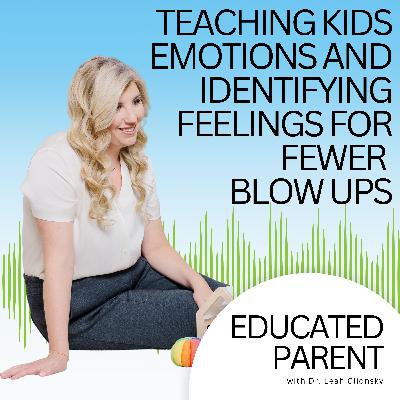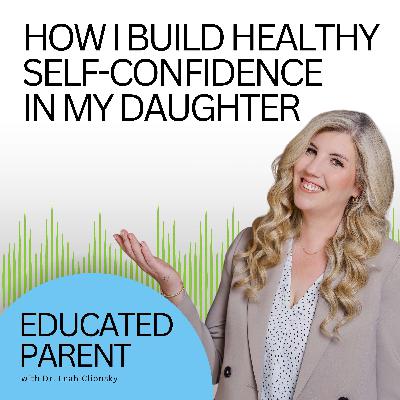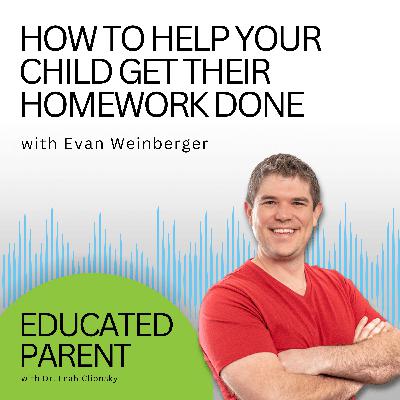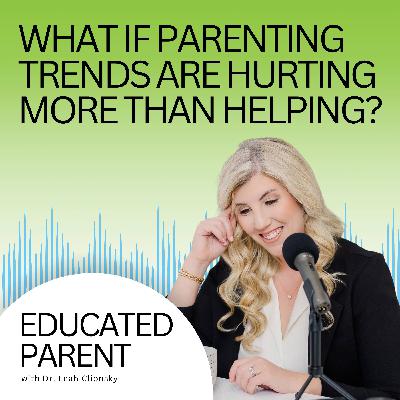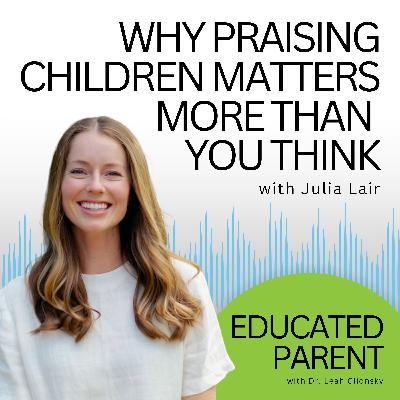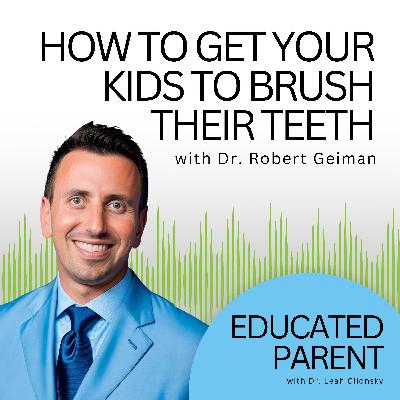Discover Educated Parent: Evidence-Based Parenting Tips to Solve Everyday Parenting Problems
Educated Parent: Evidence-Based Parenting Tips to Solve Everyday Parenting Problems

Educated Parent: Evidence-Based Parenting Tips to Solve Everyday Parenting Problems
Author: Dr. Leah Clionsky
Subscribed: 5Played: 115Subscribe
Share
© Copyright 2026 Dr. Leah Clionsky
Description
You’re doing everything you can to be a great parent. You’ve read the books, followed the mommy bloggers, asked your friends—yet somehow, parenting still feels overwhelming. One person says one thing, another says the opposite, and now you’re wondering if you’re ruining your child.
It’s not you. It’s the endless, conflicting advice that’s making parenting more stressful than it needs to be.
I’m Dr. Leah Clionsky, a licensed parenting psychologist, child development expert, and real-life mom of two. As the owner of Thriving Child Center and PCIT Experts, I’ve spent over 15 years helping parents raise emotionally healthy children with evidence-based parenting strategies.
And now, I’m bringing that expertise—and my network of trusted parenting experts—straight to you.
Welcome to Educated Parent, the podcast that gives you real answers to everyday parenting dilemmas. No guilt. No guesswork. Just expert-backed parenting tips to help you feel confident in raising emotionally healthy, thriving kids.
If you’re tired of second-guessing yourself and just want to know what actually works, you’re in the right place.
It’s time to ditch the stress and step into confident parenting—together.
LET'S CONNECT:
Thriving Child Center → https://educated-parent.captivate.fm/thrivingchildcenter
PCIT Experts → https://educated-parent.captivate.fm/pcit-experts
Instagram → https://educated-parent.captivate.fm/instagram
Want more parenting tips? Join our newsletter for expert advice straight to your inbox! → https://educated-parent.captivate.fm/newsletter
Are you a provider? Subscribe here for professional insights and parenting resources! → https://educated-parent.captivate.fm/provider-newsletter
It’s not you. It’s the endless, conflicting advice that’s making parenting more stressful than it needs to be.
I’m Dr. Leah Clionsky, a licensed parenting psychologist, child development expert, and real-life mom of two. As the owner of Thriving Child Center and PCIT Experts, I’ve spent over 15 years helping parents raise emotionally healthy children with evidence-based parenting strategies.
And now, I’m bringing that expertise—and my network of trusted parenting experts—straight to you.
Welcome to Educated Parent, the podcast that gives you real answers to everyday parenting dilemmas. No guilt. No guesswork. Just expert-backed parenting tips to help you feel confident in raising emotionally healthy, thriving kids.
If you’re tired of second-guessing yourself and just want to know what actually works, you’re in the right place.
It’s time to ditch the stress and step into confident parenting—together.
LET'S CONNECT:
Thriving Child Center → https://educated-parent.captivate.fm/thrivingchildcenter
PCIT Experts → https://educated-parent.captivate.fm/pcit-experts
Instagram → https://educated-parent.captivate.fm/instagram
Want more parenting tips? Join our newsletter for expert advice straight to your inbox! → https://educated-parent.captivate.fm/newsletter
Are you a provider? Subscribe here for professional insights and parenting resources! → https://educated-parent.captivate.fm/provider-newsletter
47 Episodes
Reverse
Watching your teen experience their first heartbreak can feel absolutely gut-wrenching as a parent. You want to fix it. You want to make the pain disappear. And at the same time, you may be flooded with memories of your own teenage breakup experiences that still live in your nervous system. In this episode, we talk about how to show up in a way that actually supports healing instead of creating more distance.I’m joined by teen mental health specialist Charity Chaffee to talk honestly about why a first heartbreak hits teens so hard, why a teenage breakup can feel world-ending, and how parents can support teen mental health without minimizing feelings or becoming overinvolved. This conversation is all about learning how to stay connected through pain, using validating emotions as the foundation for trust and emotional safety.In this episode, we cover• Why a first heartbreak is developmentally intense and why teens experience a teenage breakup differently than adults• How to support teen mental health without rushing the healing process or trying to fix the pain• The difference between dismissing feelings and validating emotions in a way that builds long-term resilience• Common parenting reactions that unintentionally make a teenage breakup harder to process• How validating emotions helps teens feel safe opening up instead of shutting down• What parents can model to support teen mental health after a first heartbreakIf your teen is struggling after a teenage breakup, this episode will help you understand what they actually need from you and how validating emotions can strengthen your relationship during one of the most vulnerable moments of adolescence. Supporting teen mental health through a first heartbreak is not about fixing the pain. It is about staying present, steady, and emotionally available when it matters most.RESOURCES MENTIONED IN THIS EPISODE:Read the full show notes HERE!Episode 13: How to Help an Angry Child Calm Down Without Losing Your Cool: The Key to Connection Before CorrectionLET'S CONNECT:Thriving Child CenterPCIT ExpertsCalm and Connected ProgramInstagramLove having expert tips you can actually use? Join our newsletter and get a beautifully designed PDF of each episode’s top 3 takeaways—delivered straight to your inbox every week.Are you a provider? Subscribe here for professional insights and parenting resources!CONNECT WITH CHARITY CHAFFEE:
Play dates are supposed to be fun, but so many parents tell me the same thing: play dates are stressful. You worry about how your child will act, whether they’ll feel left out, or if things might go sideways in front of another parent. In this episode, I wanted to give you concrete tools to help play dates feel calmer, smoother, and actually enjoyable for everyone involved.I’m joined by Maria Hammond, Ph.D., a specialist in communication development and parent-child relationships. Maria runs social skills groups for young children and brings a thoughtful, practical lens to helping kids build social skills through everyday interactions. Together, we talk about why successful play doesn’t mean perfection and how small shifts in preparation can make a big difference.In this episode, we cover:Why play dates are stressful for both kids and parents, and how anxiety can shape expectationsHow to build social skills by planning play dates witha clear structure and realistic goalsWhy going into a play date with a “mission” helps kids feel more confident and engaged in successful playHow environment and expectations impact successful play, especially for shy or sensitive kidsWhen and why it’s better to leave a play date while it’s still going wellHow parents can support build social skills without hovering or overcorrectingIf play dates have ever left you feeling tense, discouraged, or unsure of what went wrong, this conversation will help you reframe what success really looks like. With guidance from Maria Hammond, Ph.D., you’ll walk away with practical strategies to support successful play, reduce stress, and help your child build social skills in a way that feels manageable and developmentally appropriate.RESOURCES MENTIONED IN THIS EPISODE:Listen to Episode 16: How to Stop Meltdowns Before They Start By Managing Expectations and Parenting Without Power StrugglesRead the full show notes HERE!LET'S CONNECT:Thriving Child CenterPCIT ExpertsCalm and Connected ProgramInstagramLove having expert tips you can actually use? Join our newsletter and get a beautifully designed PDF of each episode’s top 3 takeaways—delivered straight to your inbox...
Eating out with kids can quickly turn into a battle over screens. If your child expects a phone the moment you sit down at a restaurant, you are not alone. In this episode, I walk you through how to reset expectations, change screen time habits, and build sustainable screen time boundaries without turning every meal into a meltdown.I explain why this pattern develops, why it is so hard to undo once it starts, and how to step out of it using evidence-based, realistic strategies. This episode is full of positive parenting tips to help you feel more confident and prepared the next time you go out to eat with your child.In this episode, you will learn:Why screen time habits form so quickly at restaurantsHow to reset expectations before you even walk through the doorPractical ways to build and hold screen time boundaries without escalating behaviorWhat to do when your child pushes back and how to respond calmlypositive parenting tips to make restaurants less stressful and more connectedIf you are tired of relying on screens at meals and want a plan that actually works, this episode will help you take the first steps toward screen-free restaurant experiences that feel doable and respectful for everyone.RESOURCES MENTIONED IN THIS EPISODE:Read the full show notes HERE!Episode 16: How to Stop Meltdowns Before They Start by Managing Expectations and Parenting Without Power StrugglesLET'S CONNECT:Thriving Child CenterPCIT ExpertsCalm and Connected ProgramInstagramLove having expert tips you can actually use? Join our newsletter and get a beautifully designed PDF of each episode’s top 3 takeaways—delivered straight to your inbox every week.Are you a provider? Subscribe here for professional insights and parenting resources!
If choosing extracurricular activities leaves you feeling overwhelmed, stretched thin, and stuck in constant mom guilt, this episode is for you. Many parents in a busy family feel pressure to do more, sign up for everything, and keep up with what other families are doing, even when it does not feel right. In this conversation, I want to help you step out of overschedulingand into confident decision-making that actually supports your child and your nervous system.In this episode, I sit down with Rachel Fein, a licensed child psychologist and board certified behavior analyst, to talk about how parents can prioritize extracurricular activities without burning out. Rachel Fein brings both clinical expertise and real-life parenting experience to this conversation, helping parents rethink mom guilt, pressure, and what children truly need to thrive.Together, we break down how overscheduling happens so easily in a busy family and how parents can make intentional choices that support connection, emotional regulation, and physical activity for kids without sacrificing family wellbeing.In this episode, we discussWhy overscheduling is so common in a busy family and how it quietly fuels mom guiltHow to evaluate extracurricular activities through the lens of family values instead of outside pressureThe difference between meaningful physical activity for kids and activity overloadHow to recognize when mom guilt is driving decisions instead of your child’s actual needsPractical strategies for setting boundaries around extracurricular activities without feeling selfishWhy protecting downtime matters just as much as physical activity for kidsHow confident parenting reduces overschedulingand supports healthier routines for the entire busy familyThis episode is a reminder that you do not need to do everything to be a good parent. When you let go of mom guilt, reduce overscheduling, and make values-based choices, you create more space for connection, regulation, and joy for both you and your child.RESOURCES MENTIONED IN THIS EPISODE:Episode 15: Should You Keep Pushing Your Child to Succeed or Back Off? With Kristin MervichLET'S CONNECT:Thriving Child CenterPCIT ExpertsCalm and Connected ProgramInstagramLove having expert tips you can actually use? Join our newsletter and get a beautifully designed PDF of...
If you feel disconnected from your child, overwhelmed by behavior struggles, or unsure how to rebuild closeness without adding more to your plate, this episode is for you. I am going to show you how just 5 minutes per day can meaningfully change your relationship with your child and help you feel more grounded in confident parenting.In this solo episode, I walk you through one of the most powerful positive parenting tips I teach as a PCIT specialist. This simple daily practice comes straight from evidence-based parent-child interaction therapy and has helped hundreds of families strengthen their relationship with your child without punishment, power struggles, or long complicated routines. I also share how I use this exact strategy in my own home when things start to feel off.In this episode, we talk about:Why 5 minutes per day of focused attention can transform your relationship with your childHow this approach supports confident parenting even when behavior feels challengingWhat parents often get wrong about play and connection, and how to fix itThe specific positive parenting tips that make these five minutes actually workHow letting your child lead builds emotional safety and strengthens your relationship with your childIf you are looking for realistic positive parenting tips, want to feel more confident in your parenting choices, and are hoping to improve your relationship with your child without burning out, this episode will give you a clear place to start. Five minutes per day really can make a difference, and I want to show you how.RESOURCES MENTIONED IN THIS EPISODE:Read the full show notes HEREListen to Episode 29 with Julia Lair: Why Praising Children Matters More Than You Think: How to Praise Your Child with Julia LairLET'S CONNECT:Thriving Child CenterPCIT ExpertsCalm and Connected ProgramInstagramLove having expert tips you can actually use? Join our newsletter and get a beautifully designed PDF of each episode’s top 3 takeaways—delivered straight to your inbox every week.Are you a provider? Subscribe here for professional insights and parenting resources!
If you have ever worried about how diet culture is shaping your child’s thoughts about food, this episode is for you. Sehrish Ali helps us understand how helping kids build a healthy relationship with food feels harder than ever when diet culture is everywhere, and child eating habits are constantly judged.In this episode, I sit down with Sehrish Ali, a psychologist and certified eating disorder specialist, to talk about how parents can protect a healthy relationship with food while raising kids in a world dominated by diet culture. Sehrish works closely with families and brings practical, compassionate insight into child eating habits, body image, and the subtle ways parents unintentionally pass down food rules. This conversation is full of real-world parenting resources you can start using immediately.In this episode, we cover:How diet culture shows up in everyday parenting and quietly influences child eating habits in ways parents often missWhat a healthy relationship with food actually looks like for kids and why perfection is not the goalThe language parents should stop using around food and bodies to support healthier child eating habitsHow to model a healthy relationship with food, even if you are still unpacking your own experiences with diet culturePractical parenting resources that help parents prioritize connection over control around mealsIf you are looking for evidence-based parenting resources, want to reduce the impact of diet culture, and hope to support long-term child eating habits that feel calm and sustainable, this episode will give you clarity and confidence. Listen to the full episode with Sehrish Ali to learn how to support a healthy relationship with food for your child and for yourself.RESOURCES MENTIONED IN THIS EPISODE:Read the full show notes HERE!LET'S CONNECT:Thriving Child CenterPCIT ExpertsCalm and Connected ProgramInstagramLove having expert tips you can actually use? Join our newsletter and get a beautifully designed PDF of each episode’s top 3 takeaways—delivered straight to your inbox every week.Are you a provider? Subscribe here for professional insights and parenting...
In this episode of the Educated Parent Podcast, I sit down with Kristin Mervich, a fellow clinician and parenting expert, to talk about how toxic masculinity shows up in subtle ways in families and how evidence-based parenting can help us raise emotionally healthy boys. We explore emotional literacy as a core skill for kids and parents, and why trusting yourself is essential when outside voices get loud. This conversation is grounded in evidence-based parenting, real-life experience, and confident parenting practices that support boys' emotional development without shame or fear.In this episode, I talk about:How toxic masculinity can quietly interfere with emotional literacy in boys and what parenting experts see happening in families every dayWhy trusting yourself as a parent is critical when teaching boys emotional literacy through evidence-based parentingHow confident parenting helps boys express emotions without fear and reduces the long-term impact of toxic masculinityThe role of a parenting expert in helping families apply evidence-based parenting strategies that strengthen emotional literacyHow trusting yourself and leaning into confident parenting creates space for boys to grow into emotionally aware and resilient humansIf you want practical insight from a parenting expert on evidence-based parenting, emotional literacy, and trusting yourself while raising boys in a culture shaped by toxic masculinity, this episode will leave you feeling more confident in your parenting choices and more grounded in your instincts.LET'S CONNECT:Thriving Child CenterPCIT ExpertsCalm and Connected ProgramInstagramLove having expert tips you can actually use? Join our newsletter and get a beautifully designed PDF of each episode’s top 3 takeaways—delivered straight to your inbox every week.Are you a provider? Subscribe here for professional insights and parenting resources!CONNECT WITH KRISTIN MERVICH:WebsiteInstagram
A pep talk for parents who feel intense pressure to create perfect holiday magic, even when things are falling apart behind the scenes. If the expectations around the holidays are making you doubt yourself, a pep talk is here to support confident parenting and remind you that real connection matters more than perfection.In this solo episode, I share a very honest parenting story from early motherhood where my attempt at creating holiday magic completely unraveled. I use that experience to offer perspective, reassurance, and positive parenting tips for parents who feel overwhelmed, discouraged, or worried that they are not doing enough. This episode is both a pep talk and a reminder that confident parenting does not require everything to go according to plan.In this episode, I talk about • Why the pressure to create holiday magic often makes parenting feel harder and more stressful • How a pep talk can help reset your mindset when a holiday moment goes wrong • What kids actually remember when parents feel pressure around holiday magic • How letting go of perfection supports confident parenting during the holidays • Simple positive parenting tips that help parents recover when plans fall apart • Why confident parenting is built in small moments, not perfect onesIf you are craving reassurance, perspective, and positive parenting tips during a season full of expectations, this episode is for you. Press play for a pep talk that helps you release the pressure of holiday magic and lean into confident parenting instead.LET'S CONNECT:Thriving Child CenterPCIT ExpertsCalm and Connected ProgramInstagramLove having expert tips you can actually use? Join our newsletter and get a beautifully designed PDF of each episode’s top 3 takeaways—delivered straight to your inbox every week.Are you a provider? Subscribe here for professional insights and parenting resources!
Holiday gatherings can feel joyful and overwhelming at the same time, and this episode will help you walk in with clarity, calm, and a strong foundation of confident parenting. When kids are navigating new environments, loud relatives, unpredictable routines, and big emotions, they need support with child emotion regulation. With the right positive parenting tips, your entire experience at holiday gatherings can feel smoother and more connected.In this conversation, I share the approach I use in my own home to prepare my kids for holiday gatherings. You will learn how to strengthen child emotion regulation, how to stay anchored in confident parenting, and how to use simple positive parenting tips to reduce stress for everyone involved. These strategies help you anticipate challenges, understand what your child needs, and protect your own emotional well-being so you can truly enjoy these moments.Here is what we will cover • How to prepare your child before holiday gatherings so they enter with stronger child emotion regulation and fewer unexpected reactions • What to say to relatives who do not understand your positive parenting tips, and how those conversations strengthen your confident parenting • How to build a calm-down kit that supports child emotion regulation even in unfamiliar settings • What to do when you feel like the overwhelmed parent, and how reconnecting to confident parenting helps you regulate in the moment • How practicing positive parenting tips ahead of time makes holiday gatherings more peaceful for the whole familyYou deserve to approach this season with steady confidence. Your child deserves the gift of child emotion regulation in environments that challenge them. These positive parenting tips will help you step into your holiday gatherings with more peace and more confident parenting.Watch the Full Episode HereLET'S CONNECT:Thriving Child CenterPCIT ExpertsCalm and Connected ProgramInstagramLove having expert tips you can actually use? Join our newsletter and get a beautifully designed PDF of each episode’s top 3 takeaways—delivered straight to your inbox every week.Are you a provider? Subscribe here for professional insights and parenting resources!
If you have ever wondered why big feelings seem to explode out of nowhere, this episode on emotional literacy is going to feel like a deep breath. I share a very real moment where I lost my cool with my kids and how understanding emotional literacy and identifying feelings could have prevented that blow-up. When we are teaching kids emotions early and model this ourselves, we reduce the overwhelm that leads to those out-of-control moments and help our kids grow into calmer, more grounded humans.In this episode, I walk you through how I use emotional literacy in my own parenting and why it is the most powerful antidote for any overwhelmed parent. We also talk about how to stop yelling by understanding what is happening inside your own brain and body, and how identifying feelings is the foundation of teaching kids emotions that truly stick.In this episode, we explore: • The moment I knew I needed better emotional literacy and how that changed the way I respond to stress • Why teaching kids emotions matters long before you expect it to work, and how it prevents future blow-ups • The real reason an overwhelmed parent snaps and what identifying feelings can reveal about what is happening underneath • A simple framework for how to stop yelling by using compassion and connection instead of pressure and perfectionism • Why emotional literacy grows stronger when we model our own mistakes and repair afterwardListen to this episode to learn how to build emotional literacy, support your child in identifying feelings, and reduce the overwhelm that leads to yelling. This is where calmer homes and fewer emotional blow-ups begin.RESOURCES MENTIONED IN THIS EPISODE:Read the full show notes HERE!LET'S CONNECT:Thriving Child Center: https://educated-parent.captivate.fm/thrivingchildcenterPCIT Experts: https://educated-parent.captivate.fm/pcit-expertsCalm and Connected Program: https://thrivingchildcenter.com/calm-and-connected-program-for-parentsInstagram: https://educated-parent.captivate.fm/instagramLove having expert tips you can actually use? Join our newsletter and get a beautifully designed PDF of each episode’s top 3 takeaways—delivered straight to your inbox every week: https://educated-parent.captivate.fm/newsletterAre you a provider? Subscribe here for professional insights and parenting resources! https://educated-parent.captivate.fm/provider-newsletter
If you are trying to prepare for parenthood and already feel like an overwhelmed parent, this episode will help you breathe again. I sit down with Dr. Kailey Buller to talk honestly about what it feels like to bring a newborn home, why even the most educated parents feel unsure, and how simple first-time parenting tips can help you feel more grounded. We cut through the noise of conflicting advice and share the kind of evidence-based parenting guidance that brings clarity back into the chaos. If you want real advice on parenting from a doctor who has delivered hundreds of babies and raised two of her own, this conversation is for you.In this episode, you will learn: • Why feeling like an overwhelmed parent is often a sign that you are trying to prepare for parenthood with care, not a sign that you are failing. • How Dr. Buller uses her experience to offer first-time parenting tips that make room for flexibility instead of perfection. • The surprising ways advice on parenting can go wrong when you take it at face value, and how evidence-based parenting helps you filter out the noise. • What new parents should know about changing medical guidance and how to stay confident while you prepare for parenthood. • How to keep going when you feel unsure, even after reading books, taking classes, or scrolling endlessly for first-time parenting tips.If you have ever felt like an overwhelmed parent, this episode will help you feel understood, supported, and far more capable than you think. Listen to the full episode to hear Dr. Kailey Buller’s three powerful pieces of advice on parenting and learn how evidence-based parenting can guide you as you prepare for parenthood.LET'S CONNECT:Thriving Child CenterPCIT ExpertsCalm and Connected ProgramInstagramLove having expert tips you can actually use? Join our newsletter and get a beautifully designed PDF of each episode’s top 3 takeaways—delivered straight to your inbox every week.Are you a provider? Subscribe here for professional insights and parenting resources!CONNECT WITH KAILEY BULLER:WebsiteInstagramTikTok
If the thought of traveling with kids over the holidays fills you with dread, you are not alone. In this episode, I share the best strategies I have learned after years of holiday trips with my own children, including how to keep them regulated, how to plan ahead, and why starting with no screens can make the entire trip easier. I walk through the simple positive parenting tips that let you stay calm and connected even when travel throws every unpredictable challenge your way.In this episode, you will learn: • How to use the first hour of traveling with kids to set the tone for calmer holiday trips. • Why starting with no screens helps your child stay regulated and saves the best strategies for when you need them most. • How to create a simple routine for traveling with kids that combines movement, connection, and positive parenting tips. • The small mistakes that make holiday trips harder, and what you can do instead, using the best strategies that have helped my own family. • How to use positive parenting tips to stay patient when traveling with kids feels overwhelming.Whether you are getting on a plane, loading up the car, or heading out on one of many holiday trips, this episode will help you stay grounded and prepared. These are the best strategies I rely on myself, and they work even when your child is tired, overwhelmed, or begging for screens before you have decided it is time. Learn how positive parenting tips, simple planning, and purposeful no-screens time can transform the experience of traveling with kids into something more manageable.Listen to the full episode for real-life tools you can use on your next trip and discover how small shifts can make your holiday trips smoother, calmer, and much more connected.LET'S CONNECT:Thriving Child CenterPCIT ExpertsCalm and Connected ProgramInstagramLove having expert tips you can actually use? Join our newsletter and get a beautifully designed PDF of each episode’s top 3 takeaways—delivered straight to your inbox every week.Are you a provider? Subscribe here for professional insights and parenting resources!
How do you actually raise confident kids in a world that constantly tells them they are not enough? In this episode, I share the real strategies I use at home and in my clinical practice to help children build healthy self-confidence from the inside out. These are the same evidence-based parenting approaches I use to guide parents who want to create calm, capable, and emotionally resilient kids. You will learn how to model positive self-talk for kids and how to help your daughter see herself as capable, kind, and deeply worthy.Here is what we’ll cover in this episode: • The exact language I use to model positive self-talk for kids and how it shapes a child’s lifelong confidence • Why true healthy self-confidence starts with how you talk to yourself as a parent and what your kids overhear • How to use evidence-based parenting strategies like modeling, praise, and reflection to raise confident kids without inflating their ego • The surprising ways our culture chips away at healthy self-confidence in girls and how you can protect your daughter from it • What it means to balance kindness with self-respect so you can raise confident kids who treat others well and stand up for themselvesIf you want to understand how to build healthy self-confidence, use positive self-talk for kids, and lean on evidence-based parenting tools that actually work, this episode is for you. Listen now to learn how you can raise confident kids who believe in themselves no matter what life brings.RESOURCES MENTIONED IN THIS EPISODE:Read the full show notes HERE!LET'S CONNECT:Thriving Child CenterPCIT ExpertsCalm and Connected ProgramInstagramLove having expert tips you can actually use? Join our newsletter and get a beautifully designed PDF of each episode’s top 3 takeaways—delivered straight to your inbox every week.Are you a provider? Subscribe here for professional insights and parenting resources!
Watch this episode on YouTube!If your child has ever came down with a fever out of nowhere, and you’ve questioned when to take your child to the doctor (or if you can wait it out at home), this episode will give you the calm, clarity, and confidence you need.I’m joined by Dr. Ross Newman (Dr. Rossome), a board-certified pediatrician and father of six, who shares trusted pediatrician advice that helps every parent make informed, evidence-based choices. Together, we talk about how to manage parental anxiety, understand fevers in kids, and use positive parenting tips to stay grounded when your child is sick.In this episode, you’ll learn: How to know when to take your child to the doctor and what signs matter most. What every parent should understand about fevers in kids and when they become a concern. Why understanding normal illness patterns helps reduce parental anxiety when your child has a fever. The most practical pediatrician advice for hydration, fever, and common viral infections. How simple positive parenting tips can help you stay calm and confident even when things feel uncertain.Parents often struggle with parental anxiety about when to take your child to the doctor, especially when symptoms are confusing. This episode helps you trust yourself again with the right pediatrician advice, clear insight into fevers in kids, and the kind of positive parenting tips that keep your home calmer and your confidence stronger.Listen now for expert pediatrician advice and discover how to handle parental anxiety with clarity about when to take your child to the doctor and practical, positive parenting tips for real-life situations.RESOURCES MENTIONED IN THIS EPISODE:Read the full show notes HERE!LET'S CONNECT:Thriving Child CenterPCIT ExpertsCalm and Connected ProgramInstagramLove having expert tips you can actually use? Join our newsletter and get a beautifully designed PDF of each episode’s top 3 takeaways—delivered straight to your inbox every week.Are you a provider? Subscribe here for professional insights and parenting resources!CONNECT WITH DR. ROSS NEWMAN:WebsiteYouTubeInstagramTikTok
Do you ever wonder how to improve executive function in your child so they can stay organized and actually turn in their work? You are not alone. In this episode, I talk with Evan Weinberger, founder of Staying Ahead of the Game, about how to improve executive function at home using simple, practical strategies that really work. Together, we explore how the right homework planner, daily checklists for kids, and consistent time management for teens can reduce frustration and help children feel capable and confident.As a psychologist and parent, I know how exhausting it can be to remind, repeat, and rescue your child from the same executive functioning challenges every week. Evan and I share real solutions that make it easier to improve executive function through structure, support, and the right tools that fit your family’s routine.In this episode, you’ll learn: • Why teaching your child to improve executive function early builds lifelong skills for independence and success • How to set up a homework planner that actually gets used and helps your child manage big projects with ease • The science behind checklists for kids and how they make daily transitions smoother and calmer • The secret to using a homework planner and checklists for kids together to build strong time management for teens • How to spot the signs that your child might benefit from extra support to improve executive function at home or schoolIf you are ready to help your child feel more capable and calm, this episode gives you the tools to improve executive function, create a reliable homework planner, build lasting time management for teens, and use checklists for kids to bring more peace and confidence into your home.Listen now to learn how to improve executive function, design a homework planner that works, strengthen time management for teens, and make checklists for kids a natural part of your family’s daily rhythm.RESOURCES MENTIONED IN THIS EPISODE:Episode 29: Why Praising Your Child Matters More Than You Think: How to Praise Your Child with Julia LairLET'S CONNECT:Thriving Child CenterPCIT ExpertsCalm and Connected ProgramInstagramLove having expert tips you can actually use? Join our newsletter and get a beautifully designed PDF of each episode’s top 3 takeaways—delivered straight to your inbox every week.Are you a provider? Subscribe here for professional insights and parenting resources!CONNECT WITH EVAN WEINBERGER:SAOTG Client ChallengeFacebookInstagrama...
Feeling torn about letting your child join in on spooky events this October? You are not alone. In this episode, I unpack how Halloween pressure affects kids and teens, and how you can support confident, age-appropriate decision-making examples that build resilience instead of anxiety.We talk about what really happens when Halloween pressure meets social expectations and how to spot early symptoms of teenage stress before they become overwhelming. You will leave this episode with clear strategies for how to deal with peer pressure and guide your child through scary situations without conflict or guilt.In this episode, we cover: • How to recognize when Halloween pressure is crossing the line into genuine anxiety and what to do about scary situations your child might face • Practical age-appropriate decision-making examples that help your tween or teen build confidence in their own judgment • Subtle symptoms of teenage stress that parents often overlook around social events • How to model how to deal with peer pressure so your child learns self-trust through your example • A realistic framework for saying “no” to activities that do not fit your family values without isolating your child sociallyIf Halloween pressure has your household feeling stretched, this episode will help you breathe easier and parent with calm confidence. Listen now to learn how to deal with peer pressure, support age-appropriate decision-making examples, navigate scary situations, and recognize symptoms of teenage stress before they take hold.LET'S CONNECT:Thriving Child CenterPCIT ExpertsCalm and Connected ProgramInstagramLove having expert tips you can actually use? Join our newsletter and get a beautifully designed PDF of each episode’s top 3 takeaways—delivered straight to your inbox every week.Are you a provider? Subscribe here for professional insights and parenting resources!
What if the very parenting trends you’re following to help your child are quietly making your parental relationship harder? In this episode, I unpack the viral tension between “f around and find out parenting” and gentle parenting, and share what truly works when we focus on evidence-based parenting that builds trust, connection, and calm in our homes.As both a psychologist and a parent, I’ve seen how easily we can lose ourselves in labels and online advice. That’s why I’m breaking down the real framework behind effective evidence-based parenting, how it changes the way we think about teaching kids boundaries, and why your parental relationship deserves more than another trendy parenting label.In this episode, you’ll learn:Why so many modern parenting trends confuse warmth with permissiveness, and what to do insteadThe biggest mistake parents make when applying f around and find out parenting (and how it can quietly damage your parental relationship)How evidence-based parenting helps you feel confident in teaching kids boundaries, even when emotions run highA practical way to balance warmth, limits, and self-regulation so your parental relationship actually strengthens over timeWhat to focus on when you’re overwhelmed by conflicting parenting trends, and how to return to what really mattersIf you’re ready to stop chasing the latest parenting trends and start using evidence-based parenting that helps you feel grounded, connected, and capable in teaching kids boundaries, this episode will help you reset and reconnect with your core values as a parent.WATCH THE FULL VIDEO ON YOUTUBE!LET'S CONNECT:Thriving Child CenterPCIT ExpertsCalm and Connected ProgramInstagramLove having expert tips you can actually use? Join our newsletter and get a beautifully designed PDF of each episode’s top 3 takeaways—delivered straight to your inbox every week.Are you a provider? Subscribe here for professional insights and parenting resources!
Have you ever wondered if you’re doing it right when it comes to how to praise your child? So many parents second-guess the benefits of praising a child, but the truth is that the right kind of praise can completely change the tone of your home. In this episode, I talk with licensed clinical social worker and PCIT therapist Julia Lair about why praising children is one of the most powerful parenting tools we have and how to use it well.We talk about the science-backed benefits of praising a child, practical examples of how to praise a child with words, and simple ways of promoting positive behaviour that you can start using today. Julia and I also discuss the fears many parents have about “too much praise” and how those worries often get in the way of connection and growth.In this episode, we’ll explore:Why the real benefits of praising a child go far beyond good manners, and how it shapes your child’s self-worthWhat makes praising children so effective, and how to avoid the common mistakes parents make when giving praiseSimple strategies for how to praise a child with words that feel natural and genuineThe most effective ways of promoting positive behaviour through everyday interactionsHow to praise your child in a way that builds confidence and connectionIf you’ve ever hesitated about how to praise your child or wondered whether it really makes a difference, this episode will help you see why praising children is one of the best investments you can make in your relationship with your child.Listen now to learn authentic, research-based ways of promoting positive behaviour and discover the lasting benefits of praising a child.LET'S CONNECT:Thriving Child CenterPCIT ExpertsCalm and Connected ProgramInstagramLove having expert tips you can actually use? Join our newsletter and get a beautifully designed PDF of each episode’s top 3 takeaways—delivered straight to your inbox every week.Are you a provider? Subscribe here for professional insights and parenting resources!CONNECT WITH JULIA LAIR:Request an appointment with her HERE!
Every October, families find themselves in the same struggle: what happens when your child just can’t pick a Halloween costume? If you’ve ever had a kid switch from Elsa to Batman to Paw Patrol in the same week, you know how exhausting kids' Halloween costumes can be for the whole household.In this episode, I share how parents on Halloween can handle the indecision without losing patience, overspending, or giving in to every last-minute whim. Together, we’ll look at why costumes feel so important to kids and how you can meet their needs while still setting boundaries with kids that protect your sanity.Here’s what you’ll hear:Why it’s so hard for kids to finally pick a Halloween costumeHow much pressure kids Halloween costumes carry socially and emotionallyWhat happens when parents on Halloween feel judged by other parentsA framework for setting boundaries with kids while still allowing creativityHow to keep your child’s joy alive without buying ten costumesIf you’ve been wondering how to help your child finally pick a Halloween costume (and stick with it), this episode will give you strategies you can actually use. You’ll feel less stressed about kids Halloween costumes and more confident about what matters most for parents on Halloween.Press play now and learn how to balance connection and fun while setting boundaries with kids this Halloween season.RESOURCES MENTIONED IN THIS EPISODE:Episode 16: How to Stop Meltdowns Before They Start by Managing Expectations and Parenting Without Power StrugglesLET'S CONNECT:Thriving Child CenterPCIT ExpertsCalm and Connected ProgramInstagramLove having expert tips you can actually use? Join our newsletter and get a beautifully designed PDF of each episode’s top 3 takeaways - delivered straight to your inbox every week.Are you a provider? Subscribe here for professional insights and parenting resources!
Getting kids to brush their teeth can feel like one of those nightly battles that drains everyone. If you’ve ever wondered how to get your kids to brush their teeth without endless fights, you’re not alone. I sat down with Dr. Robert Geiman-orthodontist, dad, and author of The Tooth Bible - to talk through the real struggles parents face and toothbrushing tips that actually work.In this episode, we cover:Why toothbrushing for toddlers is so tough and how to make it less of a battleThe surprising truth about at what age should a child brush their own teethReal-life toothbrushing tips that parents can try tonight (without fancy tools or gimmicks)How to make brushing fun with silly toothpaste flavors, colorful toothbrushes, and family gamesWhat happens when even dentists have to figure out how to get your kids to brush their teeth in real lifeIf you’ve been stressing about at what age should a child brush their own teeth, or just looking for simple toothbrushing tips that actually work, you’ll find both clarity and encouragement here.This episode will help you rethink the nightly struggle, bring some ease back into toothbrushing for toddlers, and give you confidence in how to get your kids to brush their teeth in a way that sticks.LET'S CONNECT:Thriving Child CenterPCIT ExpertsCalm and Connected ProgramInstagramLove having expert tips you can actually use? Join our newsletter and get a beautifully designed PDF of each episode’s top 3 takeaways-delivered straight to your inbox every week.Are you a provider? Subscribe here for professional insights and parenting resources!CONNECT WITH DR ROBERT GEIMAN:The Tooth Bible WebsiteChild and Adult Orthodontics Website











